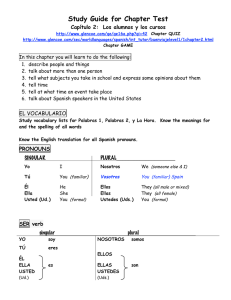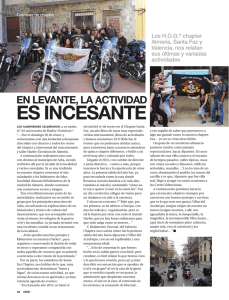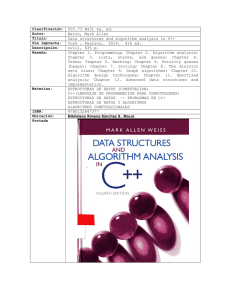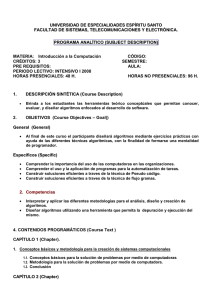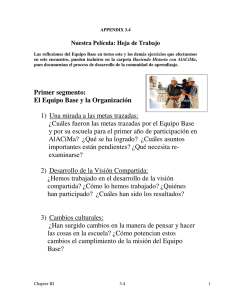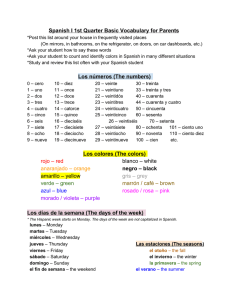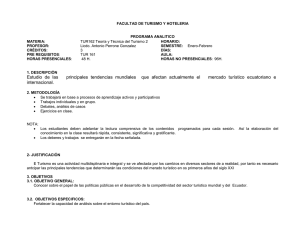Study Guide Chapter Test
Anuncio
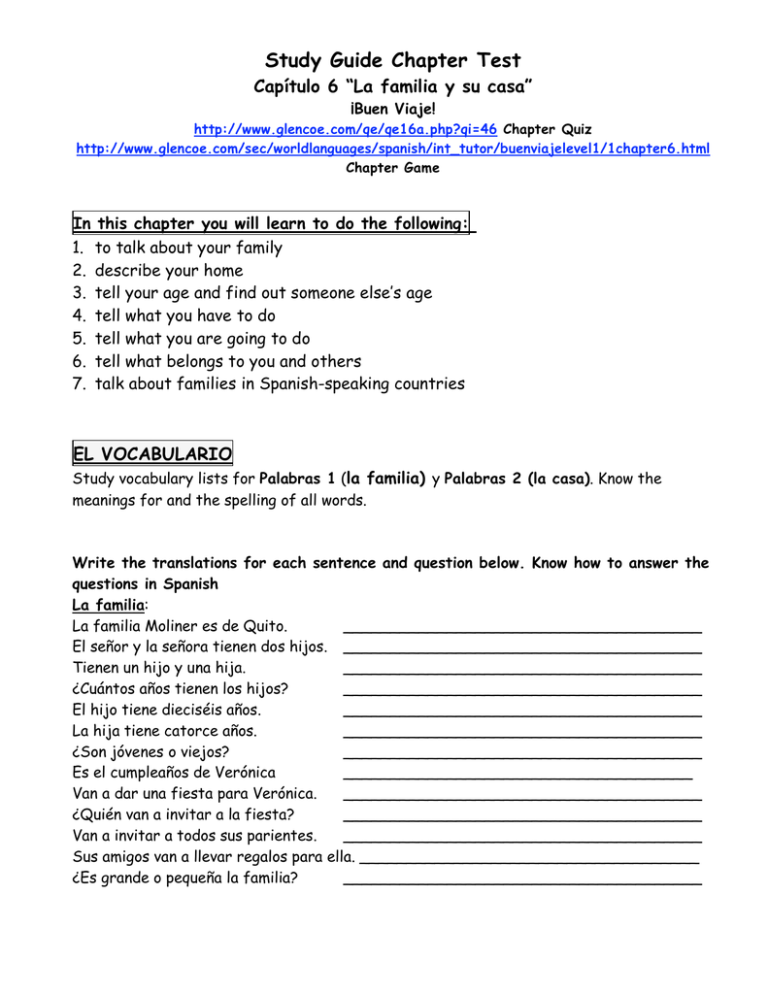
Study Guide Chapter Test Capítulo 6 “La familia y su casa” ¡Buen Viaje! http://www.glencoe.com/qe/qe16a.php?qi=46 Chapter Quiz http://www.glencoe.com/sec/worldlanguages/spanish/int_tutor/buenviajelevel1/1chapter6.html Chapter Game In this chapter you will learn to do the following: 1. to talk about your family 2. describe your home 3. tell your age and find out someone else’s age 4. tell what you have to do 5. tell what you are going to do 6. tell what belongs to you and others 7. talk about families in Spanish-speaking countries EL VOCABULARIO Study vocabulary lists for Palabras 1 (la familia) y Palabras 2 (la casa). Know the meanings for and the spelling of all words. Write the translations for each sentence and question below. Know how to answer the questions in Spanish La familia: La familia Moliner es de Quito. ______________________________________ El señor y la señora tienen dos hijos. ______________________________________ Tienen un hijo y una hija. ______________________________________ ¿Cuántos años tienen los hijos? ______________________________________ El hijo tiene dieciséis años. ______________________________________ La hija tiene catorce años. ______________________________________ ¿Son jóvenes o viejos? ______________________________________ Es el cumpleaños de Verónica _____________________________________ Van a dar una fiesta para Verónica. ______________________________________ ¿Quién van a invitar a la fiesta? ______________________________________ Van a invitar a todos sus parientes. ______________________________________ Sus amigos van a llevar regalos para ella. ____________________________________ ¿Es grande o pequeña la familia? ______________________________________ Study Guide Chapter Test Capítulo 6 “La familia y su casa” ¡Buen Viaje! http://www.glencoe.com/qe/qe16a.php?qi=46 Chapter Quiz http://www.glencoe.com/sec/worldlanguages/spanish/int_tutor/buenviajelevel1/1chapter6.html Chapter Game La casa: Alrededor de la casa hay un jardín. ______________________________________ El garaje está cerca de la casa. ______________________________________ El carro está en el garaje. ______________________________________ La casa está en la calle Juan Elcano. ______________________________________ La casa Moliner tiene siete cuartos. ____________________________________ ¿Dónde va la familia después de la cena? ____________________________________ En la sala leen y ven la televisión. ____________________________________ Tienen un apartamento en el quinto piso. ____________________________________ Suben al apartamento en el ascensor. ____________________________________ No toman la escalera. ____________________________________ Toman el ascensor. ____________________________________ IRREGULAR VERBS: ir tener (voy a la fiesta) (tengo trece años) yo tú voy vas tienes tengo él/ella/Ud. va tiene nosotros/as vosotros/as vamos tenemos ellos/ellas/Uds. váis tenéis van tienen Uses of “TENER QUE” and “IR A”: Tener que + infinitive of a verb Tengo que comprar un regalo. means “to have to” I have to buy a present. Ir a + infinitive of a verb Vamos a nadar mañana means “to be going” We are going to swim tomorrow. Study Guide Chapter Test Capítulo 6 “La familia y su casa” ¡Buen Viaje! http://www.glencoe.com/qe/qe16a.php?qi=46 Chapter Quiz http://www.glencoe.com/sec/worldlanguages/spanish/int_tutor/buenviajelevel1/1chapter6.html Chapter Game POSSESSIVE ADJECTIVES: mi / mis tu / tus su / sus su / sus su / sus = = = = = my your (familiar) his (de él) her (de ella) your (de Ud.) mi revista / mis revistas tu primo / tus primos su perro sus perros nuestro periódico / nuestra casa nuestros periódicos / nuestras casas nuestro (a) nuestros (as) su / sus su / sus su / sus = = = = = = = = = = = our our their (de ellos) their (de ellas) your (de Uds.) my magazine / my magazines your cousin / your cousins his/her/your/their dog his/her/your/their dogs our newspaper / our house our newspapers / our houses There is no (apostrophe) “‘S” in Spanish. Sentences need to be re-structured as follows: Mary’s book The book of Mary El libro de Maria. -AR VERBS -ER VERBS -IR VERBS preparar invitar dar * pasar estar * tomar tener * leer ver * ser * tener que subir ir * ir a recibir cumplir * irregular conjugation FRASES EN EL NEGATIVO: (In Spanish, the no is placed in front of the conjugated verb) Nosotros no vamos a leer el periódico = We are not going to read the nespaper Study Guide Chapter Test Capítulo 6 “La familia y su casa” ¡Buen Viaje! http://www.glencoe.com/qe/qe16a.php?qi=46 Chapter Quiz http://www.glencoe.com/sec/worldlanguages/spanish/int_tutor/buenviajelevel1/1chapter6.html Chapter Game LECTURA CULTURAL This info will be on the TEST. “La Familia Hispana” Bk p 178-179 Answer the following questions in complete sentences. 1. ¿Qué significa “padrinos” en ingles? _________________________________ 2. Cuando una persona hispana habla de su familia, ¿de quiénes habla? ______________ ________________________________________________________________ 3. ¿Son una parte importante de la familia los padrinos? _________________________ ________________________________________________________________ “La Quinceañera” Bk p 180 Read the statements below. Indicate whether each statement accurately describes a Hispanic or an American custom. Hispana U.S. 1. Dan una fiesta en honor de una muchacha que cumple quince años. _____ _____ 2. Dan una fiesta en honor de una muchacha que cumple quince años. _____ _____ 3. La muchacha recibe regalos para su cumpleaños. _____ _____ 4. La fiesta es principalmente para los amigos jóvenes da la muchacha. _____ _____ 5. Toda la familia asiste a la fiesta – los abuelos, los tíos, los padrinos. _____ _____ Study Guide Chapter Test Capítulo 6 “La familia y su casa” ¡Buen Viaje! http://www.glencoe.com/qe/qe16a.php?qi=46 Chapter Quiz http://www.glencoe.com/sec/worldlanguages/spanish/int_tutor/buenviajelevel1/1chapter6.html Chapter Game CONJUGATING REGULAR –ER VERBS 1. Remove –ER or -IR endings from the infinitive to form of the verb stem 2. Add the ending to the stem that agrees with the subject INFINITIVE STEM yo tú él ella Usted (Ud.) leer leleo lees lee lee lee ver vveo* ves ve ve ve vender vendvendo vendes vende vende vende ENDINGS nosotros ellos ellas leemos leen leen vemos ven ven vendemos venden venden -EMOS -EN -EN Ustedes (Uds.) leen ven venden -EN -O -ES -E -E -E SINGULAR CONJUGATIONS PLURAL CONJUGATIONS CONJUGATING REGULAR –IR VERBS INFINITIVE STEM yo tú él ella Usted (Ud.) escribir escribescribo escribes escribe escribe escribe vivir vivvivo vives vive vive vive recibir recibrecib o recibes recibe recibe recibe ENDINGS nosotros escribimos escriben escriben escriben vivimos viven viven viven recibimos reciben reciben reciben -IMOS -EN PLURAL -EN CONJUGATIONS -EN ellos ellas Ustedes (Uds.) -O -ES -E -E -E SINGULAR CONJUGATIONS
